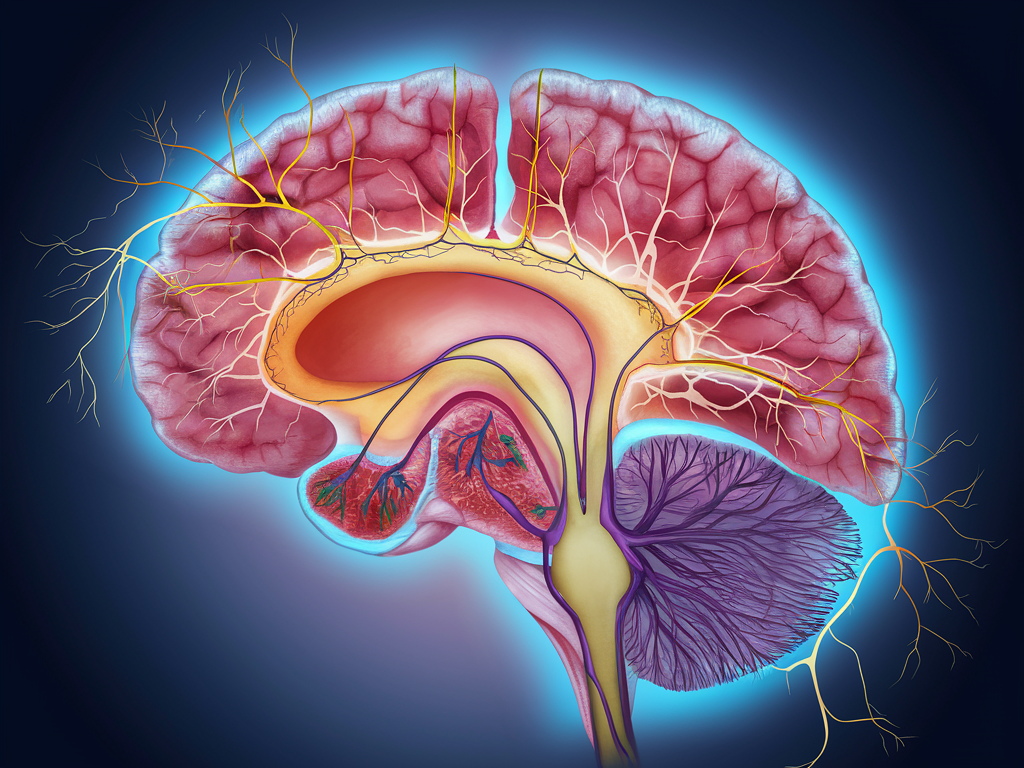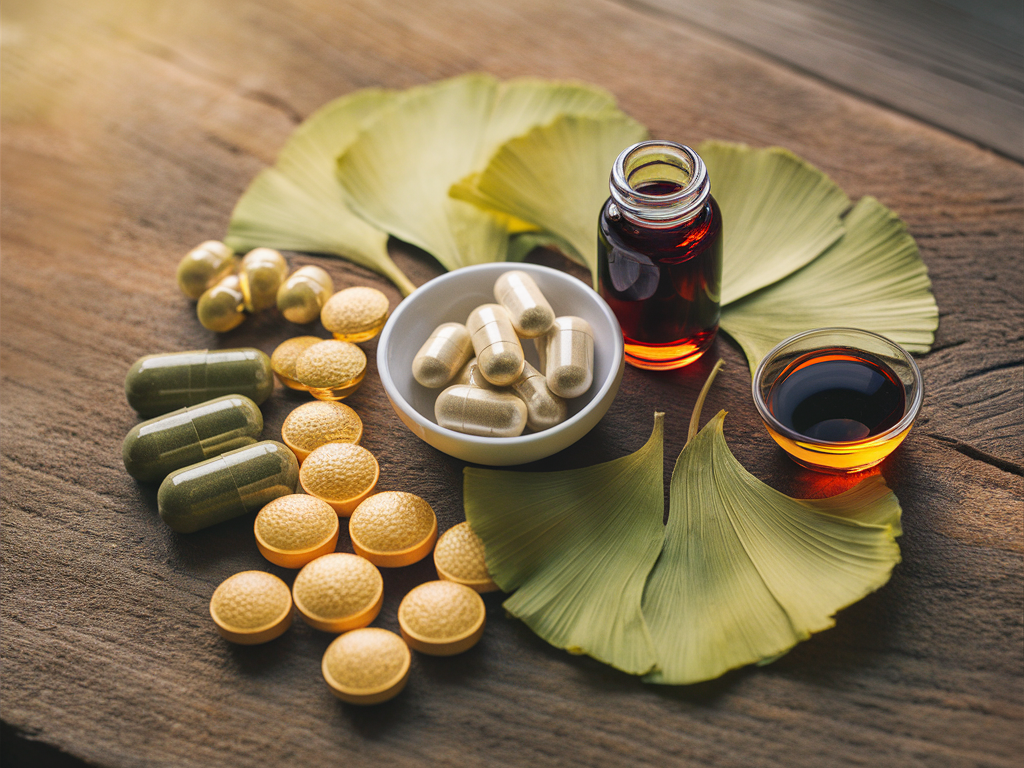Ginkgo biloba, one of the oldest living tree species on Earth, has survived virtually unchanged for more than 200 million years. This remarkable botanical survivor has been utilized in traditional Chinese medicine for millennia and has gained significant popularity in Western natural health practices over the past few decades. The distinctive fan-shaped leaves of the Ginkgo tree contain powerful bioactive compounds, primarily flavonoids and terpenoids, which are believed to be responsible for its therapeutic effects. These compounds act as antioxidants and have various effects on cellular and circulatory function that may benefit human health in numerous ways.

Evidence-Based Benefits
1. Improves Cognitive Function
Research suggests that Ginkgo biloba may enhance various aspects of cognitive performance. Multiple studies have found that this herb can improve memory, particularly in older adults. A meta-analysis published in the Journal of Alzheimer’s Disease reported that Ginkgo supplementation was associated with significant improvements in cognitive function and activities of daily living in patients with dementia when used for 22-24 weeks.
Ginkgo appears to enhance attention and processing speed as well. One study involving healthy middle-aged individuals showed improved attention and memory performance after six weeks of supplementation. The primary mechanisms behind these cognitive benefits involve increased cerebral blood flow, antioxidant protection, and modulation of neurotransmitter systems. Ginkgo’s ability to improve microcirculation in the brain ensures neurons receive adequate oxygen and nutrients, while its antioxidant properties protect brain cells from oxidative damage.
2. May Help Combat Dementia and Alzheimer’s Disease
Ginkgo biloba has been extensively studied for its potential to slow cognitive decline in dementia and Alzheimer’s disease. The EGb 761 extract, a standardized form of Ginkgo, has demonstrated modest efficacy in improving cognitive performance and stabilizing or slowing decline in patients with dementia. A landmark study published in JAMA found that 120mg of Ginkgo extract twice daily was safe and possibly effective in stabilizing cognitive impairment in dementia patients.
The herb works through multiple pathways to support brain health in these conditions. It improves cerebral blood flow, which may be compromised in dementia patients, and protects against amyloid-beta protein aggregation, a hallmark of Alzheimer’s disease. Additionally, its potent antioxidant properties help combat the oxidative stress that contributes to neurodegeneration in these conditions.
3. Reduces Anxiety and Depression Symptoms
Emerging research suggests that Ginkgo biloba may have beneficial effects on mood disorders including anxiety and depression. A systematic review found that Ginkgo extract produced effects comparable to certain antidepressant medications, particularly in elderly patients with depression accompanied by cognitive impairment.
The mechanisms behind these mood-enhancing effects may include modulation of serotonin receptors, reduction of stress hormone production, and improved blood flow to brain regions involved in mood regulation. While Ginkgo shouldn’t replace conventional treatments for serious mood disorders, research indicates it may serve as a complementary approach or option for those with mild symptoms.
4. Improves Blood Circulation
One of the most well-established benefits of Ginkgo biloba is its ability to improve circulation throughout the body. Clinical research shows it can significantly help people with peripheral arterial disease (PAD), a condition characterized by poor circulation in the legs. A meta-analysis found that Ginkgo substantially increased pain-free walking distance in PAD patients.
This circulatory benefit stems from Ginkgo’s ability to promote vasodilation (widening of blood vessels), reduce blood viscosity, and prevent platelet aggregation. These effects not only help with peripheral circulation but may also support overall cardiovascular health by improving blood flow to the heart and reducing the risk of blood clots.
5. Relieves Headaches and Migraines
Ginkgo biloba has a long history of traditional use for headache relief, and modern research is beginning to support this application. Studies suggest that Ginkgo may help prevent migraines and reduce their intensity when they occur. One clinical trial found that participants taking Ginkgo extract experienced fewer migraine attacks compared to those taking placebo.
The herb’s effectiveness for headaches likely stems from its ability to regulate vascular tone, reducing the abnormal dilation and constriction of blood vessels associated with migraines. Additionally, its anti-inflammatory and antioxidant properties may help reduce the neurogenic inflammation that contributes to migraine pain.
6. Supports Vision and Eye Health
Ginkgo biloba may offer significant benefits for eye health, particularly in conditions related to impaired ocular blood flow and oxidative damage. Research indicates that Ginkgo supplementation can improve visual function in patients with age-related macular degeneration (AMD), one of the leading causes of vision loss in older adults.
For glaucoma patients, studies have shown that Ginkgo can improve visual field indices by enhancing ocular blood flow. The flavonoids and terpenoids in Ginkgo protect retinal cells from oxidative stress and apoptosis, while its circulatory benefits ensure adequate blood flow to the small vessels supplying the eye. These combined actions make it a promising adjunctive therapy for various degenerative eye conditions.

7. May Enhance Sexual Function
Ginkgo biloba has gained attention for its potential to improve sexual function in both men and women. For erectile dysfunction, particularly cases caused by the use of antidepressant medications, Ginkgo has shown promise. One study found that 60-80% of male participants with antidepressant-induced sexual dysfunction reported improvement after taking Ginkgo extract.
The herb’s ability to enhance nitric oxide activity, improve blood flow to genital tissues, and modulate neurotransmitters involved in sexual response may explain these benefits. While not as potent as conventional medications like sildenafil (Viagra), Ginkgo offers a natural alternative with fewer side effects for some individuals with mild to moderate sexual dysfunction.
8. Anti-inflammatory Properties
Ginkgo biloba possesses significant anti-inflammatory effects that may benefit various inflammatory conditions. Research has demonstrated that Ginkgo extract can reduce levels of pro-inflammatory cytokines and markers of inflammation in the body. These anti-inflammatory properties may help with conditions ranging from arthritis to inflammatory bowel disease.
At the molecular level, Ginkgo inhibits nuclear factor-kappa B (NF-?B), a key regulator of the inflammatory response, and reduces the activity of pro-inflammatory enzymes like cyclooxygenase-2 (COX-2). These mechanisms explain why some people experience relief from inflammatory conditions when supplementing with this ancient herb.
9. May Help with Respiratory Conditions
Traditional medicine has long used Ginkgo for respiratory health, and modern research provides some support for these applications. Studies suggest that Ginkgo may help manage asthma symptoms by reducing inflammation in the airways and inhibiting platelet-activating factor, a molecule involved in allergic and inflammatory reactions.
For bronchitis patients, Ginkgo’s expectorant and anti-inflammatory properties may help reduce mucus production and airway inflammation. The herb’s ability to improve microcirculation may also benefit the lungs by ensuring adequate oxygen exchange. While more research is needed, preliminary evidence suggests Ginkgo could be a helpful adjunct therapy for various respiratory conditions.
10. Potential for Treating Tinnitus
Tinnitus, characterized by ringing or buzzing in the ears, has been a target condition for Ginkgo biloba therapy with mixed results. Some clinical trials have found significant improvements in tinnitus symptoms with Ginkgo supplementation, particularly in cases where reduced blood flow or free radical damage to the inner ear is involved.
However, it’s important to note that research results have been inconsistent. The mechanism by which Ginkgo may help involves improving cochlear blood flow and protecting auditory cells from oxidative damage. While not effective for all forms of tinnitus, individuals with vascular-related tinnitus may experience the most benefit from this herbal approach.
11. Supports Skin Health
The antioxidant properties of Ginkgo biloba make it beneficial for skin health, both when taken internally and applied topically. Research shows that Ginkgo can help protect skin cells from UV damage and oxidative stress, potentially reducing signs of aging like wrinkles and fine lines.
Topical Ginkgo preparations have demonstrated effectiveness for skin conditions like eczema and rosacea due to their anti-inflammatory and circulation-enhancing properties. The herb increases skin hydration, reduces inflammation, and improves microcirculation in the skin, resulting in a healthier complexion. These benefits have led to Ginkgo becoming a popular ingredient in natural skincare products.
12. Neuroprotective Effects
Beyond its benefits for cognitive function, Ginkgo biloba exhibits broader neuroprotective effects that may help prevent or mitigate various neurological conditions. Research indicates that Ginkgo extract can protect neurons from damage caused by oxidative stress, excitotoxicity, and ischemia (reduced blood flow).
Studies on stroke recovery have shown that Ginkgo may help restore neurological function by improving cerebral blood flow to affected areas and reducing neuronal death. Additionally, animal studies suggest that Ginkgo may offer protection against traumatic brain injury by reducing edema and oxidative damage. These neuroprotective properties make Ginkgo a promising supplement for maintaining brain health, especially in aging populations.
Potential Side Effects and Risks
1. Bleeding Risks
Perhaps the most significant concern with Ginkgo biloba is its potential to increase bleeding risk. The herb has anticoagulant and antiplatelet properties that may enhance the effects of blood-thinning medications like warfarin, aspirin, and clopidogrel. Individuals should discontinue Ginkgo at least two weeks before scheduled surgical procedures to reduce bleeding risk.
Those with bleeding disorders, those preparing for surgery, and individuals taking anticoagulant medications should either avoid Ginkgo or use it only under close medical supervision. Symptoms of concerning bleeding include unusual bruising, nosebleeds, bleeding gums, or dark stools.
2. Digestive Issues
Gastrointestinal discomfort is among the most commonly reported side effects of Ginkgo biloba supplementation. These may include nausea, diarrhea, vomiting, and abdominal pain. Usually, these symptoms are mild to moderate and often resolve as the body adjusts to the supplement.
Taking Ginkgo with food can help minimize digestive disturbances. If symptoms persist or are severe, reducing the dosage or discontinuing use may be necessary. Those with pre-existing digestive conditions should exercise caution when starting Ginkgo supplementation.
3. Headaches and Dizziness
Ironically, while Ginkgo may help treat headaches for some people, it can cause headaches and dizziness in others. These paradoxical reactions might be related to Ginkgo’s effects on cerebral blood flow and neurotransmitter systems, which can vary greatly between individuals.
Starting with a lower dose and gradually increasing it can help reduce the risk of these side effects. If headaches or dizziness occur and persist despite dosage adjustments, discontinuing use is recommended. These symptoms typically resolve once the supplement is no longer being taken.

4. Allergic Reactions
Allergic reactions to Ginkgo biloba are possible, particularly in individuals who have allergies to plants in the Ginkgoaceae family. Symptoms of an allergic reaction may include skin rash, itching, swelling (especially of the face, tongue, or throat), severe dizziness, or difficulty breathing.
There’s also concern about cross-reactivity with urushiol, the allergenic compound found in poison ivy, poison oak, and mango skins. Individuals with known allergies to these plants should exercise caution with Ginkgo. Any signs of allergic reaction warrant immediate discontinuation and medical attention, especially if breathing is affected.
5. Drug Interactions
Beyond blood-thinning medications, Ginkgo biloba can interact with numerous other drugs. It may reduce the effectiveness of anticonvulsants used to control seizures and could interact with medications processed by the liver, including certain antidepressants, calcium channel blockers, and statins.
Ginkgo should not be combined with MAO inhibitors or SSRIs due to the risk of serotonin syndrome. Additionally, taking Ginkgo with herbs that have similar properties, such as garlic, ginger, or turmeric, may enhance bleeding risk. Always consult a healthcare provider about potential interactions before starting Ginkgo, especially if you take other medications or supplements.
6. Special Precautions
Pregnant and breastfeeding women should avoid Ginkgo biloba due to insufficient safety data and concerns about its effects on uterine tone and bleeding risk. The herb is not recommended for children, as most research has been conducted in adult populations.
Individuals with diabetes should monitor blood glucose levels closely when taking Ginkgo, as it may affect insulin and glucose metabolism. People with epilepsy or a history of seizures should use Ginkgo with caution, as there are some reports suggesting it might lower the seizure threshold in susceptible individuals.
How to Use Ginkgo Biloba
Ginkgo biloba is available in various forms, including standardized leaf extracts (the most studied form), capsules, tablets, tinctures, and teas. The most common standardized extracts contain 24-25% flavonoid glycosides and 6% terpene lactones, which are considered the primary active constituents.
For cognitive benefits and most therapeutic uses, clinical studies typically use doses ranging from 120-240mg of standardized extract daily, often divided into 2-3 doses. For circulatory conditions, similar dosages are employed. Lower doses of 40-60mg daily may be appropriate for preventative purposes or when starting supplementation.
Timing considerations include taking Ginkgo with meals to minimize digestive discomfort. Some people report increased alertness when taking it in the morning or early afternoon, while others find it helpful for sleep when taken in the evening. Consistency is key, as Ginkgo’s effects often develop gradually over several weeks of regular use.
Quality matters significantly with herbal supplements. Look for products standardized to contain 24-32% flavone glycosides and 6-12% terpene lactones, manufactured by reputable companies that undergo third-party testing. Products should be certified free of ginkgolic acid, a potential allergen that should be present at less than 5 parts per million.
Conclusion
Ginkgo biloba stands as a fascinating example of an ancient botanical remedy that continues to demonstrate relevant therapeutic potential in modern research. Its wide-ranging benefits for cognitive function, circulation, eye health, and various other systems make it one of the most versatile herbal supplements available. The robust antioxidant, anti-inflammatory, and circulatory-enhancing properties of this ancient tree provide biological mechanisms that explain many of its observed benefits.
However, these benefits must be weighed against potential risks, particularly bleeding concerns and drug interactions. As with any supplement, individual responses vary, and what works well for one person may not help another. The quality of Ginkgo products on the market also varies considerably, making product selection an important consideration.
Current research continues to explore new applications for this ancient herb, with promising directions in neurodegenerative disease prevention, metabolic health, and inflammatory conditions. Future studies will likely refine our understanding of specific populations that benefit most from Ginkgo supplementation.
While Ginkgo biloba has earned its place among the most extensively researched herbal medicines, it is not a panacea. Responsible use involves consulting healthcare providers, particularly for individuals with existing health conditions or those taking medications. When used appropriately, this “living fossil” of the plant world offers a well-documented natural approach to supporting various aspects of health and well-being.

